I have to admit that after the turmoil during fair week, I was very ready for butchering day. Out of the 15 birds that we bought, we had 13 make it to butchering day. The five my parents raised and eight out of ten that we raised.
If you would like to read about the first seven weeks (with lots of pictures) here they are: Week 1 – Week 2 – Week 3 – Week 4 – Week 5 – Week 6 – Week 7
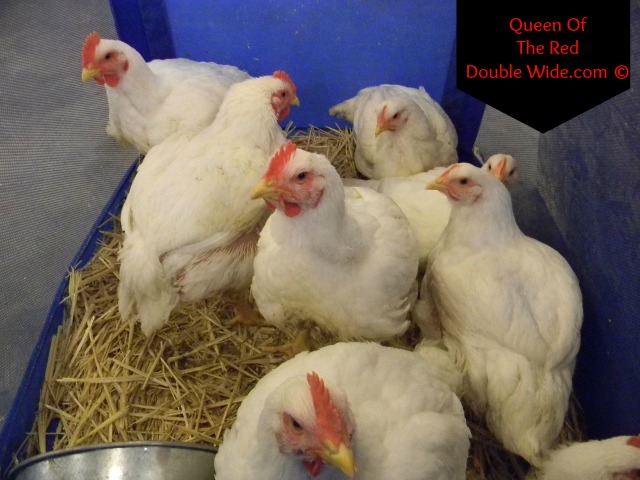 The evening before we butchered it POURED down rain while we were packing up at the fair. By the time we got home they were soaking wet out in their little chicken tractor. So we brought them in the shop to dry off. They quickly dried and we kept them in for the night in case of another down pour.
The evening before we butchered it POURED down rain while we were packing up at the fair. By the time we got home they were soaking wet out in their little chicken tractor. So we brought them in the shop to dry off. They quickly dried and we kept them in for the night in case of another down pour.
We took the feed out 12 hours before butchering time; this is so the crop and intestinal tract has time to clear.
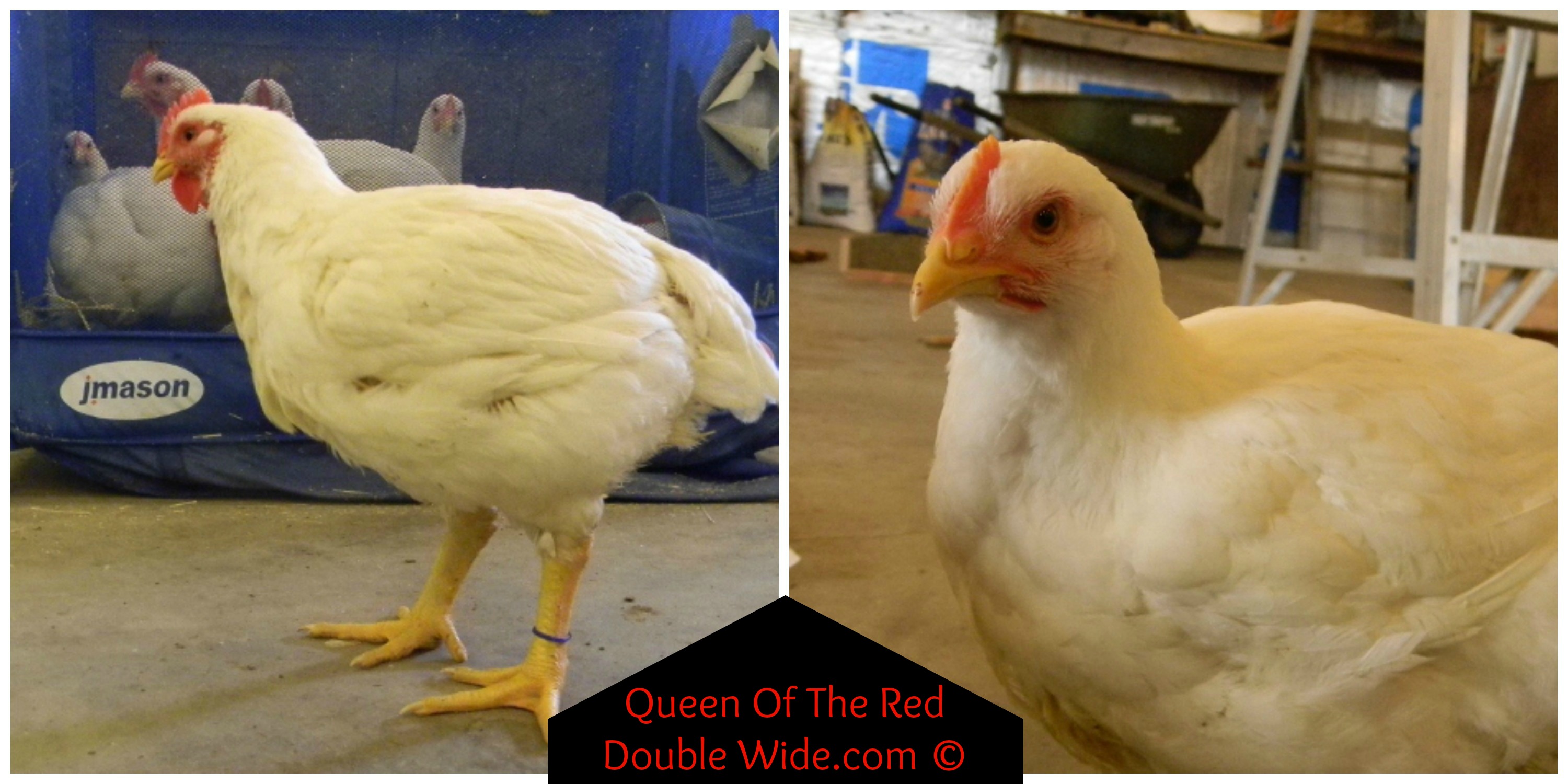 I weighed a few of them that morning and they were all around 7 pounds.
I weighed a few of them that morning and they were all around 7 pounds.
We put them in a couple of kennels and headed to my parents house. They have raised turkeys in the past and have a better set up for butchering than we do.
We don’t have any killing cones so the guys used a chopping block and an axe. I think next year we will buy or make some cones. Especially if we have more than 13 chickens.
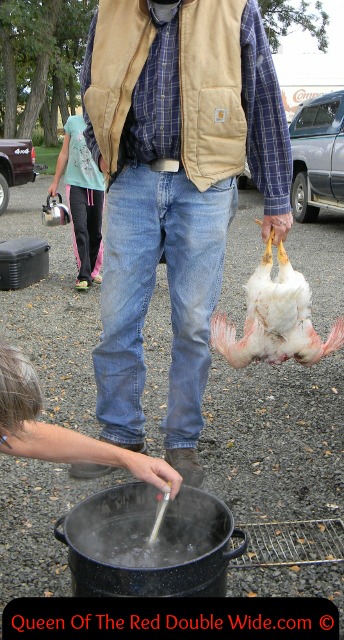 For scalding we kept the temperature between 145°and 150° F. and scalded them for 1 minute. It worked great! I couldn’t believe how easy they were to pluck!
For scalding we kept the temperature between 145°and 150° F. and scalded them for 1 minute. It worked great! I couldn’t believe how easy they were to pluck!
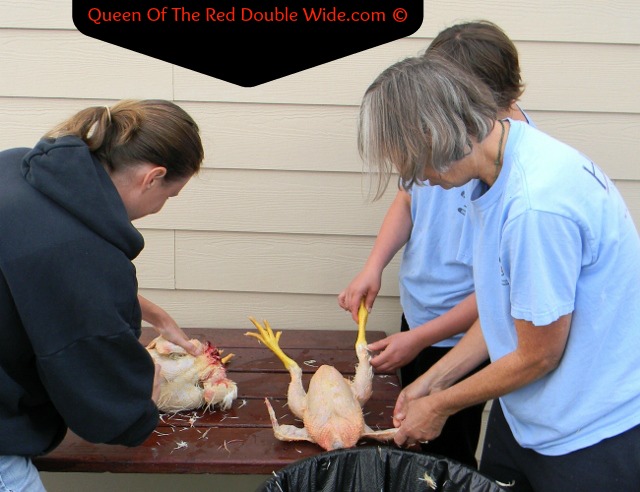 This is me, my mom, and one of my sisters plucking.
This is me, my mom, and one of my sisters plucking.
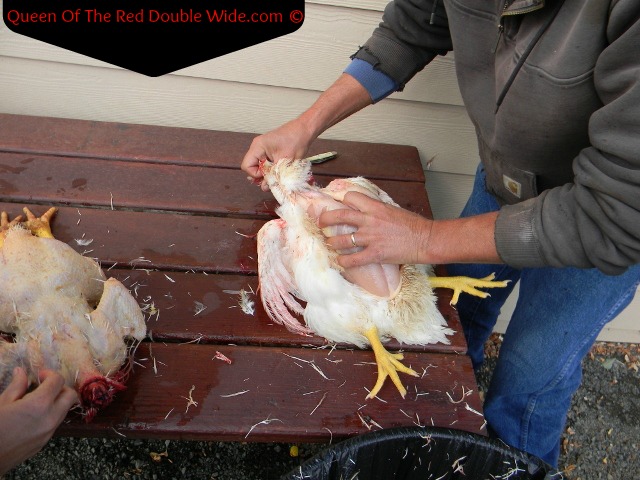 Digger skinned a few of them to see if it was faster than plucking. Skinning was definitely faster. Here are a couple pics of a skinned chicken, this was before it was gutted and cleaned. Check out all that meat!!!
Digger skinned a few of them to see if it was faster than plucking. Skinning was definitely faster. Here are a couple pics of a skinned chicken, this was before it was gutted and cleaned. Check out all that meat!!!
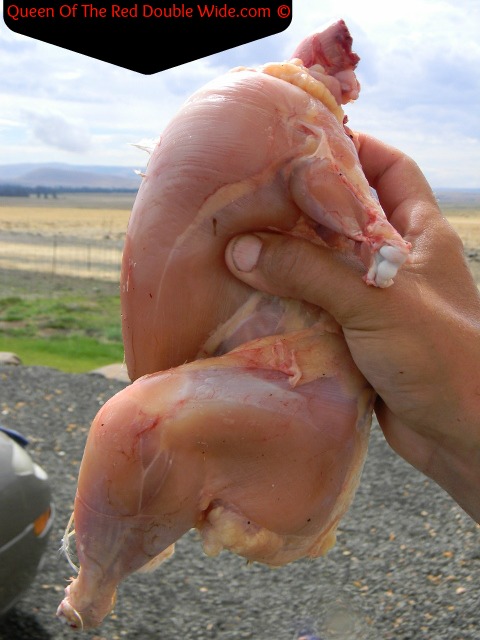 This is the gutting, cleaning, and wrapping station. After they were cleaned we wrapped them in plastic wrap and put them in zip lock bags. They were all around 5 pounds. 🙂
This is the gutting, cleaning, and wrapping station. After they were cleaned we wrapped them in plastic wrap and put them in zip lock bags. They were all around 5 pounds. 🙂
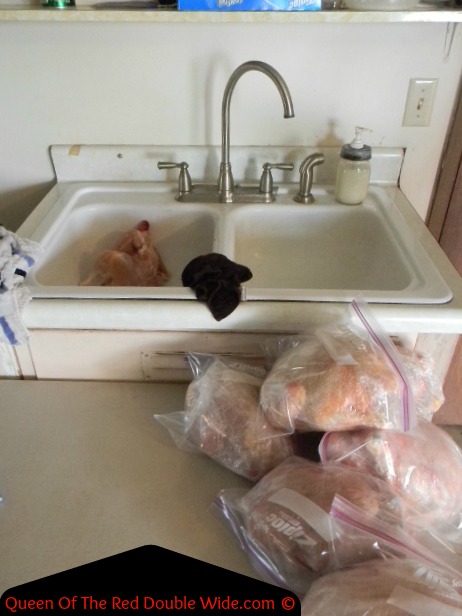 The whole process only took about 2 hours for 13 chickens despite the fact everyone was exhausted from the fair. I was surprised at how smoothly it went and that it didn’t bother me at all. I was very pleased with the sizes of the dressed out birds. My parents were pleased too and have decided to stick with chickens instead of turkeys from now on. Mom already said she wants 20 more next year! I’m sure we will get more next year too. I’m thinking I’d like to try some freedom rangers, just so I can compare.
The whole process only took about 2 hours for 13 chickens despite the fact everyone was exhausted from the fair. I was surprised at how smoothly it went and that it didn’t bother me at all. I was very pleased with the sizes of the dressed out birds. My parents were pleased too and have decided to stick with chickens instead of turkeys from now on. Mom already said she wants 20 more next year! I’m sure we will get more next year too. I’m thinking I’d like to try some freedom rangers, just so I can compare.
All said and done they cost right at $9.00 each. Not to bad for five pound, pastured chickens!

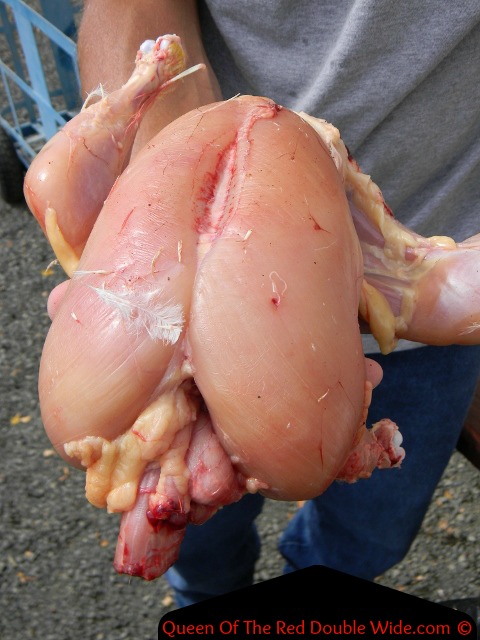


What a good deal and the price ended up being really affordable! I’m sure working as a team made things much easier. I like the looks of the skinned chicken. 🙂
Thanks Candy, I hope they taste good too. 🙂
See, I told you you would be ready to butcher them when the time came! 🙂
They look great. We ended up with 38 out of 40 birds in the freezer. It’s a good feeling to be done and be able to enjoy all the hard work. Good job!
You were soooo right Donna! 38 out of 40 is GREAT!
Try milk jugs next time. Cut a hole big enough for the next in the pour spout, and cut the bottom off to put the bird in. We screwed two to a sawhorse, and they worked beautifully.
What a great idea! I just threw a big jug in the garbage, I’m going to have to go dig it out!!
Great post Grace! I wish now we would’ve butchered our own. You make it look so easy!! I’m going to feature this on the Homeacre Hop this week!! 🙂
Thanks soooo much Mary! It really was easy…many hands makes light work. 🙂
Well, this was an informative read for a city girl. 🙂 Once again, I know I will never be cut out for the role of a farmers wife . Great deal on the chickens though!!
Haha!! It really wasn’t bad at all. 🙂 See you tomorrow Bree!
What did you feed them that you ended up around $9 a bird? That’s a great price! We’ve been feeding organic chick starter and shoooey! It is EXPENSIVE! Our birds will be butchered in 2 weeks.
Hi Gracie! We fed ours chick starter for the first three weeks then we switched to flock raiser. We did not go with organic this time, because of funds and availability. Maybe next summer? I wish it wasn’t so expensive! You will have peace of mind knowing you gave them the best you could, for them and for you! Good luck with your organic birds! 🙂 Thanks for stopping by
Did you feed them just cracked corn for the last week? Was told that it would make them taste better. Have been trying to find out if this is true, can you help.
Hi Sheryl, I’ve never heard that before?? We only fed them flock raiser after they were to big for the chick starter.
Great blog! helped me a bunch….we are in week three of 24 (lost one) I am going the tractor route along with doing Organic feed….hope they taste good. It’s been really fun working these birds….I was worried they would be very smelly and to my surprise they are not as long as they are moved daily, or twice daily even. Did you let your birds rest 48 hours before freezing? I heard this was good for a tender meat. Thanks for such a great blog with amazing pics! I found your blog searching for pics of three week old Xs to compare to mine.
Glad you found my blog Scott! The bigger ours got the more we had to move them around to keep them from getting stinky too. We have a huge lawn and it was amazing how much better the grass looked after the chickens had been on it….good fertilizer and they ate all the dandelions. 🙂 We did not let our birds rest for 48 hours. I had never heard that before, we might try that next time. Our chickens taste great, I’m sure yours will too! Good luck
Great timeline I am raising some mcmurray cornish cross right now for the first time and couldn’t be happier I really think the broiler booster has helped them out…awesome job again thank you!
Thank you! Good luck with your chicks. 🙂
Did you caponize the roosters? If not, did you notice a flavor or texture difference between the hens and roosters. I am trying to figure out whether to order straight run or all hens. I don’t want tough or string meat.
Hi Jennifer, We did not caponize our roosters and they all tasted the same to me. 🙂 Good luck with your chickens!
We just bought 35 cornish cross. First time raising them! We have had layers for years. I hope they turn out well. They are one week old today and in a couple weeks we will put them in a converted horse run-in shed on their own half acre. Hope it goes okay! Thanks for sharing your story!
Good luck with your little peeps! They won’t stay little for long. We are planning on getting about 30 this spring too. 🙂
trying this today!
We have been raising Cornish Giants for several years and are finding the meat is usually tough, no matter how I cook it. We’ve been butchering at about 12 weeks. So this year we want to do them earlier to see if the meat has a better texture. We just weighed a couple of them and they are around 3 – 3.5 lbs at exactly 7 weeks. Does it make sense that they would be ready to butcher in 2 or 3 weeks?
Hi Mildred, I have heard the older they are the tougher the meat. They do gain fast so hopefully by 10 weeks they are 6 or 7 pounds. I would think anything lighter than that wouldn’t be worth butchering yet?? Sorry I’m not more help. We have 1 Cornish this year that I’m going to butcher at 11 to 12 weeks with our Ranger Broilers. I just weighed him at almost 7 weeks old and he’s 5 pounds 2 ounces!! He’s a monster! Hopefully he’s not tough as leather. 🙂
Thanks for the reply. All we can do is wait and see, I guess! 🙂
Off I go to the neighborhood farm with my first ever meat birds (cornish broilers). This was my first attempt at raising any type of chicken or animal other than a dog or cat. Of the 26 birds that were shipped, 4 have died (one was my fault on day 4 – didn’t know he was under the water container when I placed it down). The nine and a half weeks went by fast and they are big and healthy looking. I dread trying to transfer them into cages seeing as I did enjoy handling them too much. Hope this goes well! I appreciated the summary of the butchering, I might try that in the future (I used to teach dissection for my human anatomy and physiology students and feel I can handle the work involved). If this works out, I will raise another batch in the spring and think about organic turkeys during the summer/fall months. Thanks again for the posts!
correction: didn’t enjoy handling the chickens too often
How much noise they make? I am afraid if nabouher complain
This batch of Cornish cross were not noisy at all, the roosters never started crowing. However, all the roosters in the last batch of meat chickens we raised (that were Ranger broilers and a Cornish cross rooster)…all started crowing by the time we butchered them they were a noisy bunch. But the pullets
(females) were very quiet.
Which one is less noisy females or roasters?